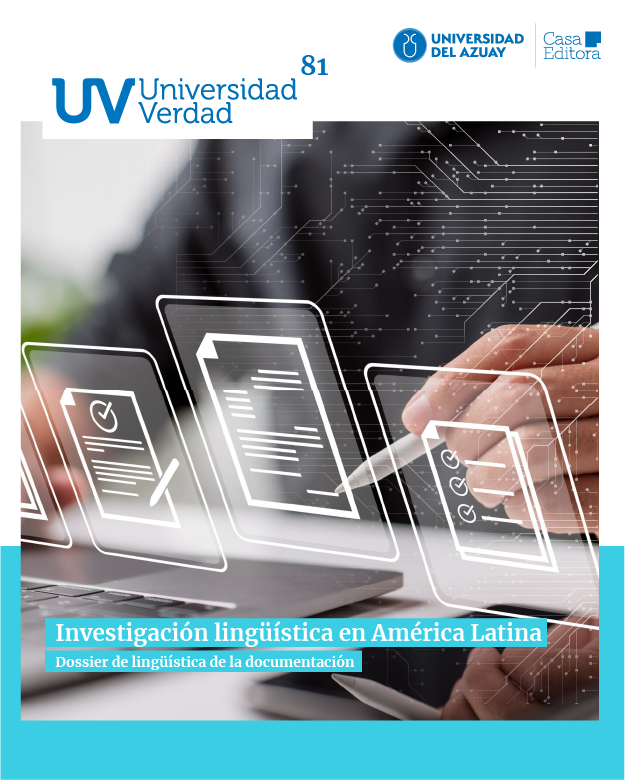DOCUMENTACIÓN LINGÜÍSTICA: UN ACERCAMIENTO AL PÚBLICO DE LAS REDES SOCIALES DE DIÁLOGOS VITALES, COMO UN ACTOR SOCIAL PARA LA REVITALIZACIÓN Y MANTENIMIENTO DE LA LENGUA KICHWA
DOI:
https://doi.org/10.33324/uv.v2i81.564Schlagworte:
Documentación lingüística, público de redes, actor social, mantenimiento lingüístico, preservación culturalAbstract
La lingüística de la documentación surgió hace más de 20 años; y en la última década, han aparecido nuevos debates y desafíos, que proponen incluir a otros actores: los usuarios de las redes sociales como protagonistas para la documentación y preservación de
las lenguas. En ese sentido, el objetivo de este estudio es, determinar el impacto que han tenido los carruseles de léxico español-kichwa, dirigidos a los seguidores de redes sociales de Diálogos Vitales como un mecanismo para la revitalización y mantenimiento
de esta lengua nativa en el Ecuador. Se trata de un estudio exploratorio-descriptivo con un enfoque cuantitativo y una muestra representativa de los seguidores de las redes sociales Facebook, Instagram y LinkedIn, en un período de 5 meses. Los datos presentados en los resultados hacen referencia a las variables: alcance, interacción, reacciones, comentarios, veces compartido e impresiones; sin embargo, para la discusión se toman solamente tres de ellas: interacciones, reacciones y personas alcanzadas. Los
resultados muestran que los usuarios y seguidores de estas redes se vieron impactados por los posteos. En el caso de Facebook las personas alcanzadas fueron de 557 y en Instagram de 401. Si se considera que los usuarios de la primera red son 550 y de la segunda,
255; significa que las publicaciones alcanzaron al 100% y más de estos. En la red social LinkedIn, se logró obtener 613 impresiones positivas sobre los posteos, nuevamente, si se toma en cuenta el número de seguidores, que es de 454, vuelve a ocurrir lo mismo
que en las redes anteriores. Finalmente, en esta nueva era digital es indispensable trabajar en la creación de una conciencia pública y una cultura más participativa en torno a las lenguas y la diversidad lingüística, que permita la protección de los patrimonios
lingüísticos y culturales en el país, Latinoamérica y el mundo.
Palabras clave: Documentación lingüística, público de redes, actor social, mantenimiento lingüístico, preservación cultural.
Abstract
Documentation linguistics arose more than 20 years ago. In the last decade, new debates and challenges have arisen to include other actors: users of social networks as protagonists for the documentation and preservation of languages. In this sense, the objective of this study was to determine the impact that the Spanish-Kichwa lexicon carousels have had, aimed at the followers of the social networks Diálogos Vitales as a mechanism for the revitalization and maintenance of this native language in Ecuador. This is an exploratory-descriptive study with a quantitative approach and a representative sample of followers of the social networks Facebook, Instagram and LinkedIn over a period of 5 months. The data presented in the results refer to the variables: scope, interaction, reactions, comments, times shared and impressions; however, for the discussion only three of them are taken: interactions, reactions
and people reached. The results show that the users and followers of these networks were impacted by the posts. In the case of Facebook, 557 people were reached and 401 on Instagram. If we consider that the users of the first network are 550 and of the
second, 255; means that the posts reached 100% and more of these. In the LinkedIn social network, it was possible to obtain 613 positive impressions on the posts, again, if the number of followers is taken into account, which is 454, the same thing happens again
as in the previous networks. Finally, in this new digital age, it is essential to work on creating public awareness and a more participatory culture around languages and linguistic diversity, which allows the protection of linguistic and cultural heritage in the
country, Latin America and the world.
Keywords: Linguistic documentation, public networks, social actor, linguistic maintenance, cultural preservation





